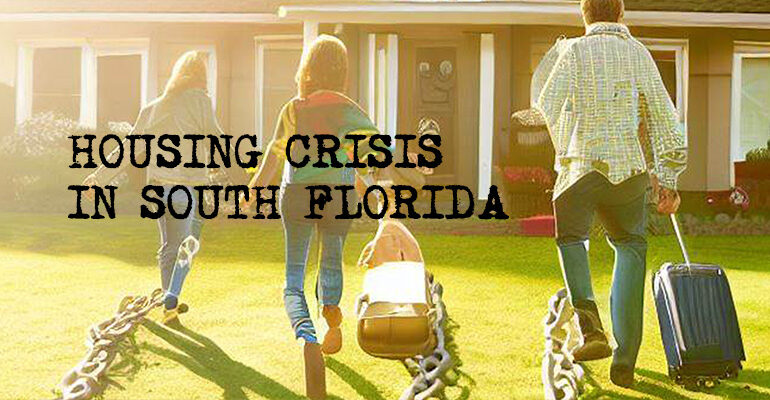Solutions for the Housing Crisis in South Florida
The Sunshine State has seen rapid population growth since the invention of air conditioning, but it has felt more rapid since the pandemic. Florida led all U.S. states in population growth for the first time since 1957, closing 2022 with a 1.9% increase in the total population. Florida has an estimated state population of 22.25 million people in 2023, making it the third most populous state. The weather, lack of an income tax, and historical cost of living have drawn millions of people to the state. These perks generated strong demand that increased home values in the state by 80% from 2017 to 2022. Property values are forecasted to continue growing over the next five years. While not the only factor, remote work made it easier for people to move around. Remote work will make it easier for home values to continue their growth.
Unfortunately, Florida’s long-held reputation as a great place for retirees is facing some challenges, with the cost of living rising dramatically in the past few years. When more people move into a state, rent prices go up to match growing demand. That’s part of the reason why rent in Tampa outpaced the rest of the nation by rising 40% since March 2020, the start of the pandemic. Southeast Florida wasn’t far behind, netting a 36% rent increase during the same time. As renters find themselves paying an additional $1,000/mo without a corresponding income increase, some of them are downsizing or moving out of the state. Meanwhile, the state continues to draw more people, indicating current problems will get worse.
The housing crisis will grow more alarming due to the state’s popularity and growth, but there are some solutions worth exploring.
One fix is to create more housing units, and quicker construction can make a more immediate impact.
Quicker Constructions
Local housing crises can only get solved if enough people leave the state or more housing units become available. Supply and demand are economic fundamentals, and demand doesn’t seem to be going away anytime soon. One fix is to create more housing units, and quicker construction can make a more immediate impact.
Several developers met at Bison’s multifamily conference in Fort Lauderdale to discuss solutions. Alex Ballina mentioned his developer, Resia, used a concrete modular form for their project. This decision allowed the team to complete a 216-unit complex in seven months. While this can help, it’s not perfect, considering over 400,000 people moved into Florida in 2022. Developers would have to complete 1,852 projects with 216 units each to accommodate 2022’s newcomers with new housing.
Assuming developers can create that many projects, they would need enough land to put those buildings. While some land is available, the government also controls surplus land. The government can offer this land to developers on long-term leases and financially incentivize developers to build units.
Landlords who cater to affordable housing don’t have as much leeway with increasing rent prices.
Addressing Issues That Discourage Affordable Units
Most apartments and rental properties are built with a middle- or upper-class individual in mind. These properties command higher rent prices and can provide landlords with more enticing profit margins. Some properties appeal to individuals seeking lower rent payments. These Naturally Occurring Affordable Housing (NOAH) properties provide a solution, but they are a bit run down. NOAH properties are affordable multifamily properties that are unsubsidized. Some of these properties have seen better days, but rehabbing them can make them more appealing. Fixing up these properties also makes them less likely to get torn down. It’s important to address why these types of buildings don’t get created as frequently.
Affordable housing sounds great, but it isn’t always good for landlords in practice. Landlords need the potential to make a profit to justify an investment. Rentals for middle- and upper-class households are outpacing affordable housing because those properties have higher profit margins.
Landlords who cater to affordable housing don’t have as much leeway with increasing rent prices. Some affordable housing units cannot raise the rent at all. Landlords don’t increase rent prices because they are bad people. These investors must contend with the rising costs to maintain the property, cover insurance policies, and pay for other expenses. More importantly, they must contend with property taxes, and with Florida real estate surging, those property taxes become more expensive.
Combine that with the fragility of the affordable housing model. It doesn’t take many vacant units for an affordable housing project to be unprofitable for the landlord. Why would an investor construct a property that is extremely unlikely to yield a profit, has very limited upside, and will get its profits usurped by rising costs?
Government incentives. Like credits, waivers, and property tax discounts. can make affordable housing more attractive to investors. Investors must see the profitability potential of any asset to put down the necessary capital for funding. Even investors who want to offer affordable housing will get their profit margins crushed due to rising costs and the inability to raise rent prices. Rehabilitating existing NOAH properties is also expensive for a property that already produces low profit margins. Some people have proposed a surtax loan program for NOAH building owners seeking funds for rehab costs.
These adjustments can make Florida an attractive place for retirees again. People who have called Florida home for decades can find housing with this model instead of being forced out of their home state.
Changing Zoning Laws
Zoning laws determine what type of property can go up on a parcel of land. They also influence how single-family homeowners can modify their land. On June 10, 2020, Governor Ron DeSantis signed a law into legislation with several affordable housing provisions. One of those provisions allows for the development of accessory units on single-family parcels. These units must have rent priced at affordable rates for low- and middle-income individuals. Local governments must authorize these legislations for them to be viable in the area.
Creating space for mixed-use properties can also provide more units for Floridians. Mixed-use properties are multi-purpose, meaning the same property can have commercial and residential elements. Most Las Vegas casinos follow this model, where they have hundreds of units put on top of their casinos. These are commercial properties that provide many units for people to rent. Doing this to a smaller degree in Florida can add housing units in commercial areas that normally do not contribute to solving the housing crisis.
That housing pressure affects everyone, not just people looking for a new place.
This Problem Will Get Worse for Everyone
You can solve a housing crisis by adding more housing or hoping for population declines. The latter is unlikely to happen in Florida for the next several years as more people rush into the state, creating further pressures on the housing supply. That housing pressure affects everyone, not just people looking for a new place.
People living paycheck to paycheck will struggle to call Florida their home as higher prices force them out. Renters who can afford the monthly payments may find it more difficult if their $2,000/mo rent becomes a $3,000/mo rent in five or ten years. Most people’s incomes are not increasing that quickly. Rent prices stand to increase based on current trends, but an increase in the supply of housing units can turn $2,000/mo into $2,500/mo instead of $3,000/mo in the coming decade.
The surging demand has helped homeowners who saw their property values increase significantly since the pandemic. While this trend has helped homeowners who were looking to sell, it creates other problems for existing homeowners. Current sellers may have a more difficult time finding buyers willing to pay the market price, but the issues stretch beyond that.
When a home’s value increases, so do the property taxes. This is a constant rule across the United States. Although Florida has no state income tax, the average real property tax rate in Florida is 0.98%. If your home was valued at $300,000 before the pandemic, you paid $2,940 in property taxes, assuming you had the average real property tax rate.
If your home suddenly jumped to $700,000 since the pandemic, your property tax bill would have come to $6,860. Furthermore, your pre-pandemic insurance policy may no longer offer sufficient protection. You will either need to switch to a more expensive insurance policy to get enough coverage or risk having to reach deep into your pockets if your home is subject to flood damage or other incidentals.
The housing crisis affects some people more than others, but it hurts everyone. Finding solutions and addressing problems quickly can help the growing demand and give lifelong residents the ability to stay in the state they have always called home.
Quicker constructions, more support for landlords who want to create and rehab NOAH properties, and modifying zoning laws can make an impact on the current housing crisis.








